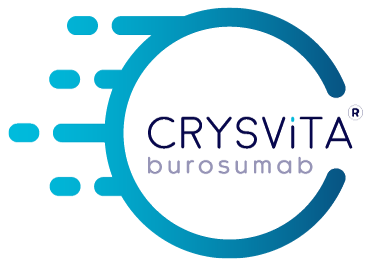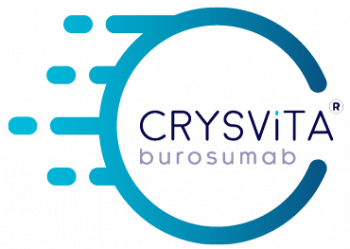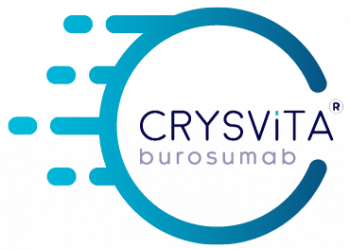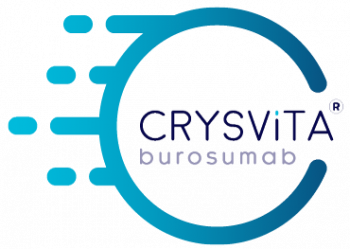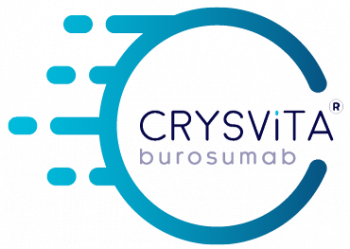크리스비타는 성인 XLH 환자의 인산염 레벨, 골연화증 평가척도, 통증,
경직 및 이동성의 유의한 개선 효과를 입증하였습니다.
Table of Contents
Phase III efficacy and safety
성인 XLH 환자를 대상으로 크리스비타의 유효성과 안전성은 3상 임상시험에서
연구되었습니다.
시험 디자인1,2
18-65세 성인 XLH 134명 환자에서 크리스비타의 유효성과 안전성을 연구하기 위해 전세계에 있는 25개 시험기관에서 무작위배정, 이중 눈가림, 위약 대조, 3상 임상시험을 수행하였습니다. 이중 눈가림, 위약 대조 기간은 24주였고, 이후 크리스비타로 24주간 지속 투여하였습니다.
| Study population (N=134):1 | |
|---|---|
| Aged 18 to 65 years | TmP/GFR <2.5 mg/dL |
| A diagnosis of XLH supported by a confirmed PHEX mutation) | BPI worst pain score ≥4 |
| Serum phosphate below the lower limit of normal (LLN), 2.5 mg/dL (0.81 mmol/L) | |
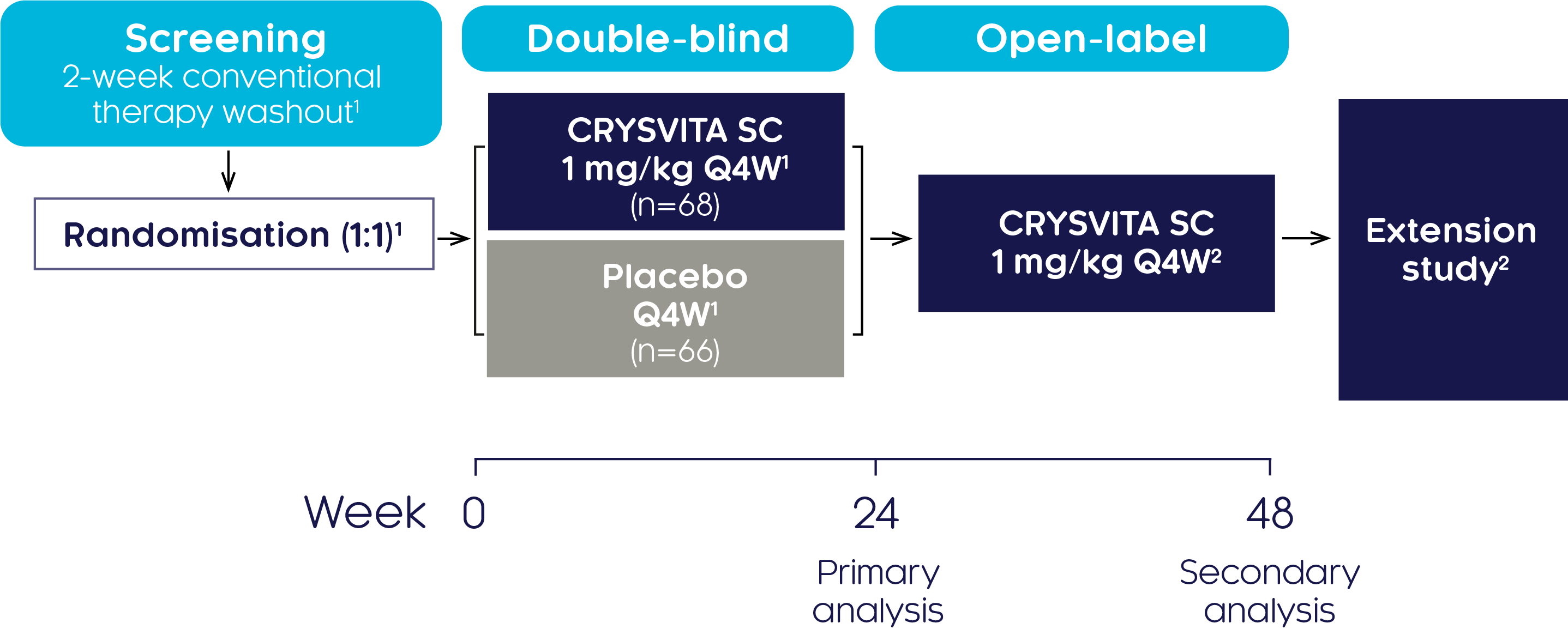
1차 평가변수1,2
- 베이스라인 후 제24주까지 투여 주기에 걸쳐 평균을 구했을 때, 투여 간격의 중간점에서 평균 혈청 인산염 농도가 ≥ LLN 2.5 mg/dL (0.81 mmol/L)를 나타낸 시험대상자 비율
2차 평가변수1,2
- 환자보고결과: 베이스라인 후 48주까지 BPI 최악 통증 점수 변화, 및 12주마다 평가한 경직 및 신체 기능에 대한 WOMAC 점수
- 베이스라인 후 48주까지 생화학적 표지자 변화: TmP/GFR 및 1,25(OH)2D
- 베이스라인 후 48주까지 골 재형성 표지자 변화: P1NP, CTx 및 BALP
탐색적 평가변수 (assessed every 12 weeks)1,2
- 베이스라인 후 48주까지 활동성 가성골절 또는 골절 수 변화
- 베이스라인 후 48주까지 6MWT에서 총 보행거리 변화
Safety Endpoints1,2
- 이상사례 및 중대한 이상사례 발생률
Patient characteristics at baseline2
| Characteristic | Placebo → CRYSVITA® (n=66) |
크리스비타® → CRYSVITA® (n=68) |
|---|---|---|
| Mean age, years (SD) | 38.7 (12.8) | 41.3 (11.6) |
| Female, n (%) | 43 (65.2) | 44 (64.7) |
| WOMAC stiffness†, mean (SD) | 61.4 (20.8) | 64.7 (20.3) |
| WOMAC physical function†, mean (SD) | 43.9 (19.9) | 50.8 (19.7) |
| BPI worst pain‡, mean (SD) | 6.5 (1.4) | 6.8 (1.3) |
| TmP/GFR§, mg/dL, mean (SD) | 1.6 (0.37) | 1.7 (0.40) |
| Serum phosphate§, mg/dL, mean (SD) | 1.9 (0.32) | 2.0 (0.30) |
| Serum 1,25(OH)2D§, pg/mL, mean (SD) | 33.5 (15.6) | 32.4 (13.0) |
| Enthesopathy on X-ray, n (%) | 65 (98.5) | 68 (100.0) |
| Unhealed fracture/pseudofracture, n (%) of participants | 38 (57.6) | 32 (47.1) |
| No. of fractures/pseudofractures | 91 | 65 |
| Fractures | 13 | 14 |
| Pseudofractures | 78 | 51 |
†0 (최상의 건강 상태)부터 100 (최악의 건강 상태) 범위의 정규화한 척도 사용. ‡0 (통증 없음)부터 10 (최악의 통증) 범위의 척도 사용. §정상범위: TmP/GFR, 2.5–4.2 mg/dL; 인산염, 2.5–4.5 mg/dL; 1,25(OH)2D, 18–72 pg/mL.11
Phosphate regulation (CRYSVITA® vs placebo)
크리스비타® XLH가 있는 성인에서 인산염 항상성을 회복시킵니다 XLH2
크리스비타® achieved mean serum phosphate levels above the LLN as early as Week 1, which was sustained over a period of 22 weeks compared with placebo (p<0.001)2
Mean change in serum phosphate2
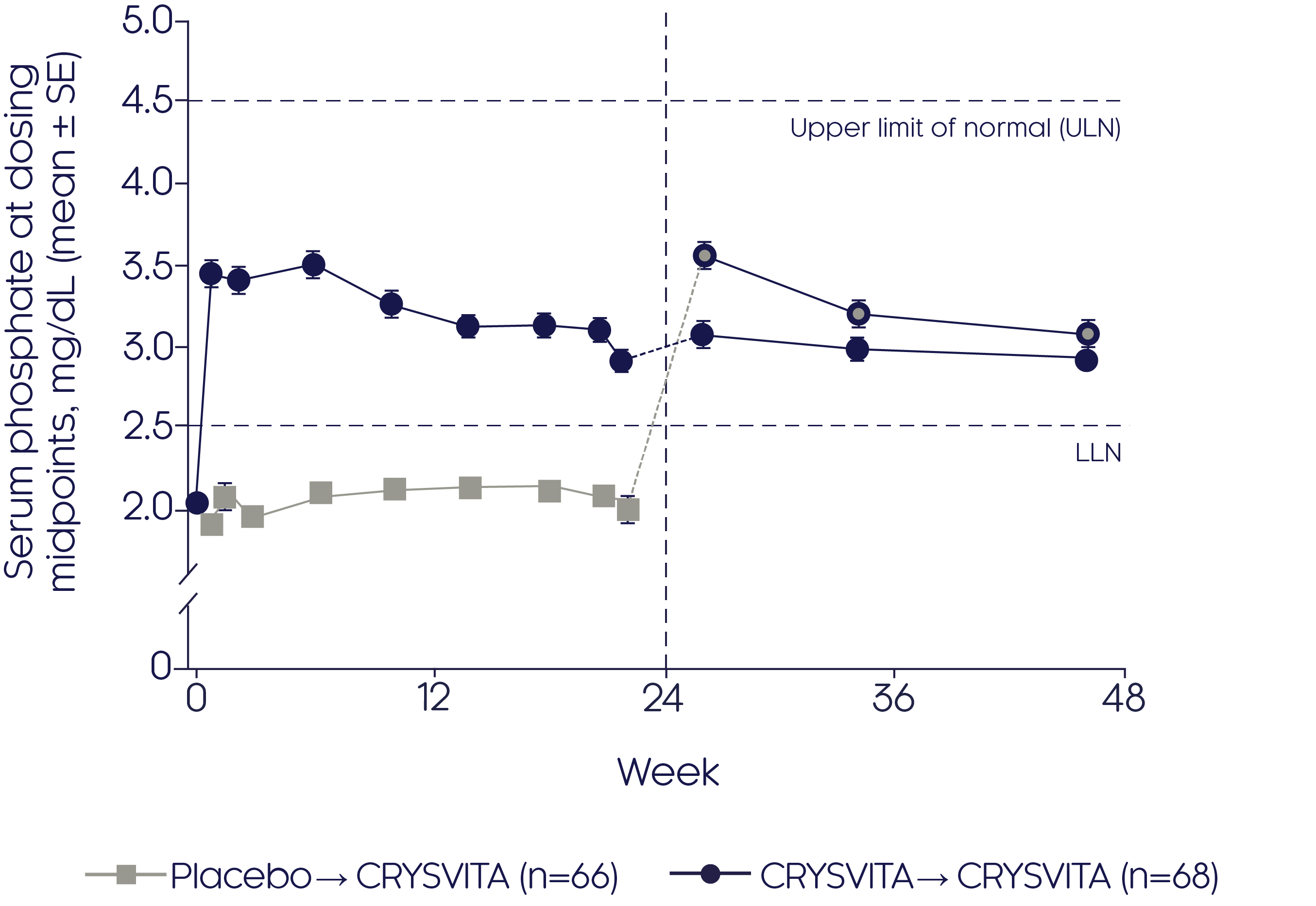
Adapted from Portale AA, et al, 20192
- Improvements in mean serum phosphate were sustained over the 24-week open-label continuation period in the CRYSVITA® group (p value NR)
- 크리스비타® treatment initiated at Week 24 in the placebo group promptly increased mean serum phosphate concentrations that remained at or above the LLN during the 24-week open-label continuation period (p value NR)
크리스비타® achieved significantly (p<0.001) greater TmP/GFR as early as Week 2, which was sustained over 24 weeks compared with placebo2
Mean change in TmP/GFR2

Adapted from Portale AA, et al, 20192
- Improvements in TmP/GFR were sustained over the 24-week open-label continuation period in the CRYSVITA® group (p value NR)
- Initiation of CRYSVITA® treatment in the placebo group showed an increase in TmP/GFR from baseline to the end of the 24-week open-label continuation period (48 weeks from baseline, p value NR)
크리스비타® achieved significantly (p<0.001) greater increases in serum 1,25(OH)2D compared with placebo over 22 weeks2
Mean change in serum 1,25(OH)2 D2
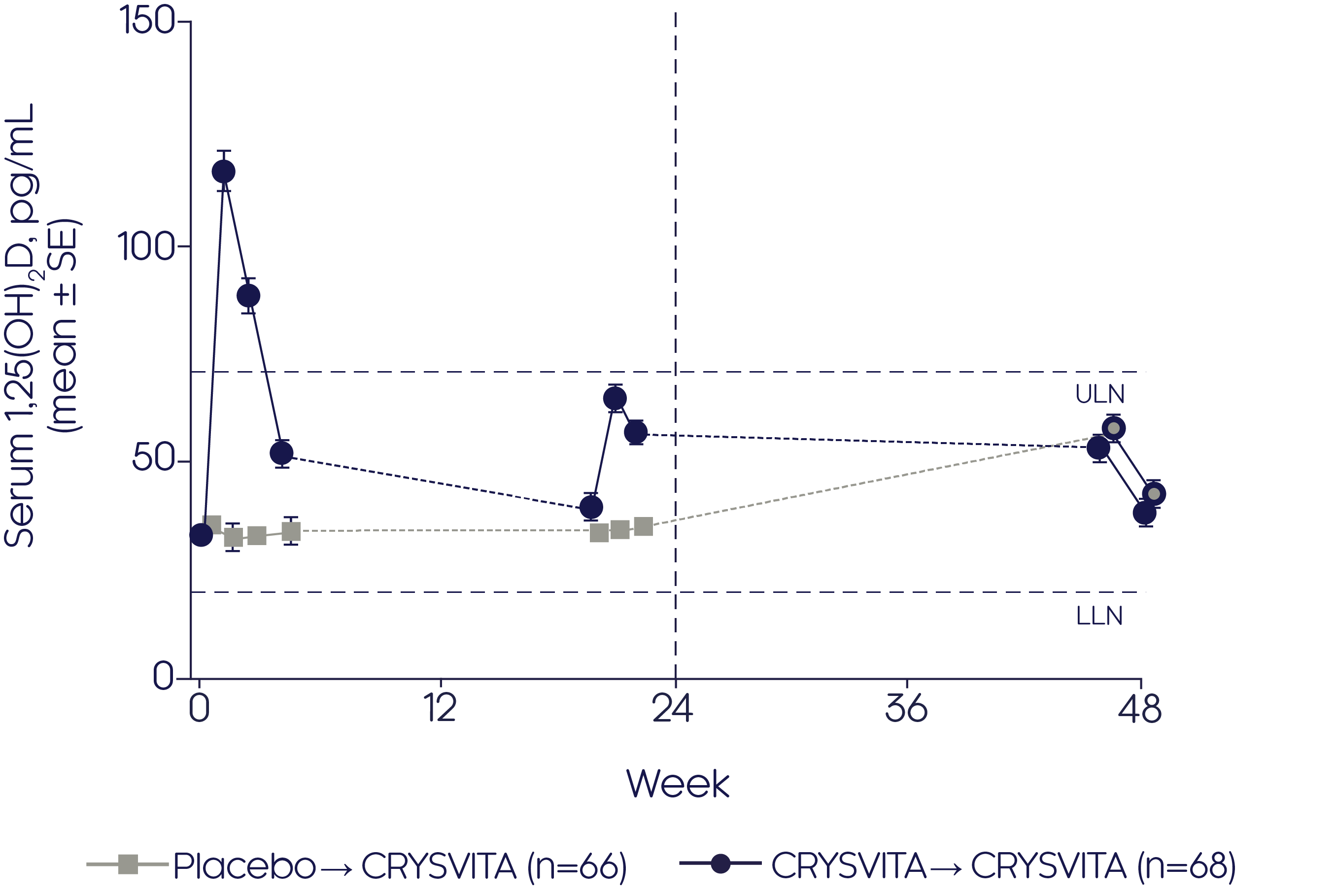
Adapted from Portale AA, et al, 20192
- 크리스비타® achieved an increase in 1,25(OH)2D from baseline to the end of the 24-week open-label continuation period (48 weeks from baseline) in the CRYSVITA® group (p value not reported)
- Initiation of CRYSVITA® treatment in the placebo group showed an increase in 1,25(OH)2D from baseline to the end of the 24-week open-label continuation period (48 weeks from baseline, p value not reported)
Pain, stiffness, physical function and mobility
크리스비타® improves pain, stiffness, functional disability and mobility in adults with XLH2
크리스비타® significantly (p<0.001) improved BPI worst pain score from baseline to Week 48 in the CRYSVITA® - CRYSVITA® group2
Mean change in BPI worst pain score2

Adapted from Portale AA, et al, 20192
- 크리스비타® also significantly (p<0.001) improved BPI worst pain score from Week 24 to Week 48 after treatment initiation in the placebo-CRYSVITA® group2
*p<0.001 for least squares (LS) mean change from baseline to Week 48 (CRYSVITA® → CRYSVITA®), **p<0.001 for LS mean change from Weeks 24 to 48 (placebo → CRYSVITA®).
크리스비타® significantly (p<0.001) reduced the WOMAC stiffness score at Week 24 compared with placebo1
Mean change in WOMAC stiffness score2
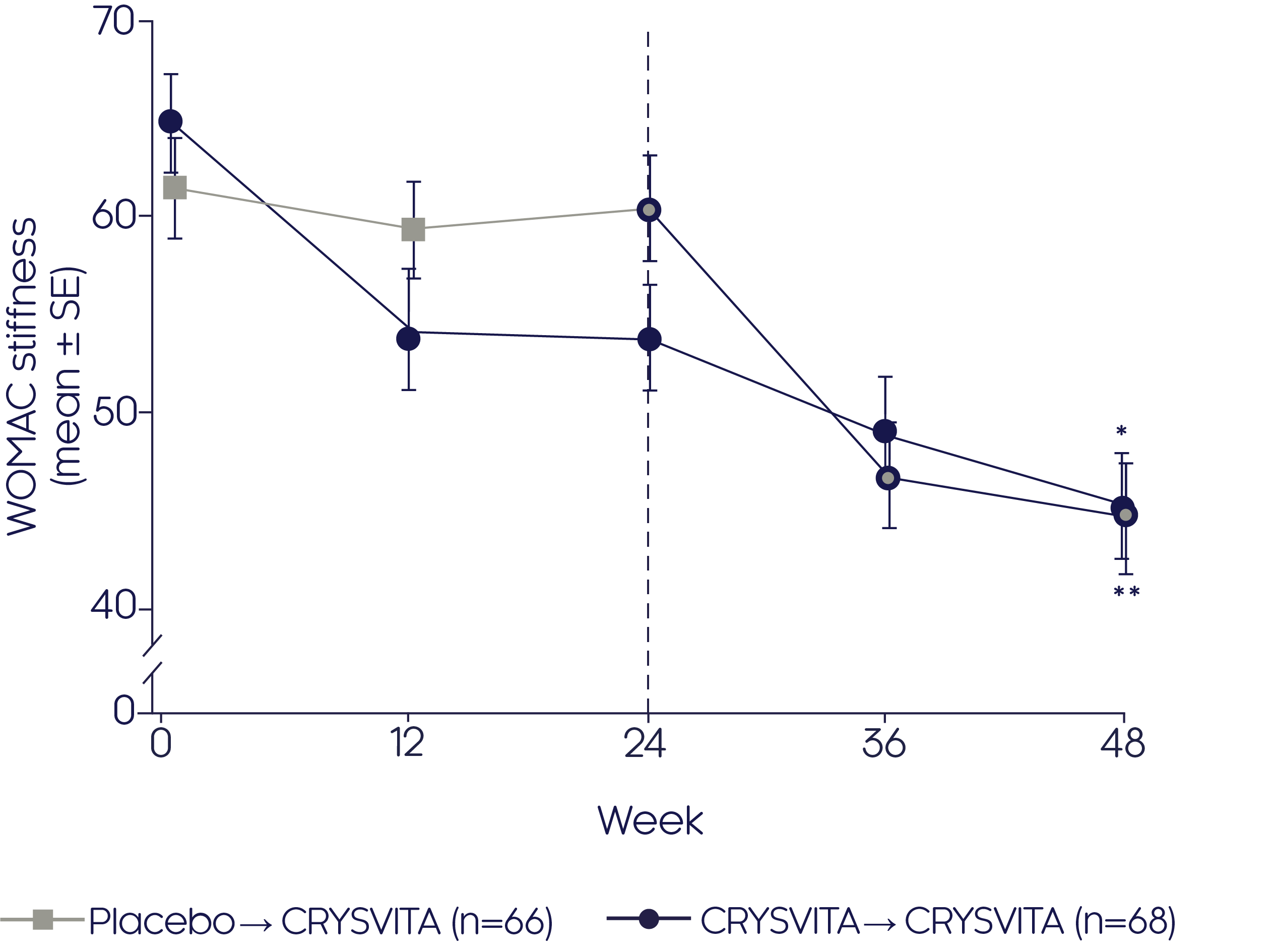
Adapted from Portale AA, et al, 20192
- Significant (p<0.001) improvements were seen from baseline to Week 48 in the CRYSVITA®-CRYSVITA® group2
- 크리스비타® also significantly (p<0.0001) improved stiffness according to the WOMAC score in those patients who switched from placebo to CRYSVITA® from Week 24 to Week 482
*p<0.001 for LS mean change from baseline to Week 48 (CRYSVITA® → CRYSVITA®), **p<0.001 for LS mean change from Weeks 24 to 48 (placebo → CRYSVITA®).
크리스비타® significantly (p<0.001) improved the WOMAC physical function impairment score from baseline to Week 48 in the CRYSVITA®- CRYSVITA® group2
Mean change in WOMAC physical function score2

Adapted from Portale AA, et al, 20192
*p<0.001 for LS mean change from baseline to Week 48 (CRYSVITA® → CRYSVITA®), **p<0.001 for LS mean change from Weeks 24 to 48 (placebo → CRYSVITA®).
크리스비타® significantly (p<0.001) improved mobility, shown by increased functional exercise capacity (measured by the 6MWT) from baseline to Week 48 in the CRYSVITA®- CRYSVITA® group2
Mean change in total distance walked in 6MWT2

Adapted from Portale AA, et al, 20192
- 크리스비타® also significantly (p<0.001) improved mobility, shown by increased functional exercise capacity (measured by the 6MWT) in those patients who switched from placebo to CRYSVITA® from Week 24 to Week 482
*p<0.001 for LS mean change from baseline to Week 48 (CRYSVITA® → CRYSVITA®), **p<0.001 for LS mean change from Weeks 24 to 48 (placebo → CRYSVITA®).
Fractures and pseudofractures
골절/가성골절은 XLH가 있는 성인에서 크리스비타 치료 시 보다 빠르게 치유됩니다®
In adults with XLH treated with CRYSVITA®, 63% of active fractures and pseudofractures at baseline were fully healed at Week 48 (p value NR)2
Proportion of baseline active fractures and pseudofractures fully healed2

Pseudofracture healing in a 38-year-old woman treated with 크리스비타®1

Bone remodelling
크리스비타® improved key markers of bone remodelling2
- At Week 48, CRYSVITA® showed an improvement in markers of bone remodelling (P1NP and CTx [p<0.05] and BALP [p=ns]) from baseline2
| Bone remodelling marker | Placebo → CRYSVITA® group2 | 크리스비타® → CRYSVITA® group2 |
|---|---|---|
| P1NP, LS mean (95% CI) | 76.9 ng/mL (54.9, 98.9) | 35.7 ng/mL (17.5, 53.9) |
| CTx, LS mean (95% CI) |
295.9 pg/mL (200.8, 391.1) |
127.1 pg/mL (36.7, 217.5) |
| BALP, LS mean (95% CI) |
6.7 μg/L (2.6, 10.7) |
1.2 μg/L (−2.3, 4.8) |
- In the CRYSVITA® → CRYSVITA® group, the largest increase in all three parameters was seen at the first post-baseline measurement, with subsequent attenuation and stabilisation of the effect of CRYSVITA® over 48 weeks2
- In the placebo → CRYSVITA® group, the largest increase in all three parameters was seen at the first assessment after initiation of CRYSVITA® at Week 242
Safety (24 and 48 Weeks)
크리스비타® was well tolerated and had an acceptable safety profile up to 48 weeks in adults with XLH2
- Adverse events in the CRYSVITA® group were similar to those in the placebo group with respect to incidence, nature and severity2
- 이상사례는 대부분 중증도가 경증 내지 중등증이었습니다2
- Hyperphosphataemia was observed in 7% of participants during CRYSVITA® treatment, but without clinical manifestations, which then resolved after dose reduction2
| Double-blind treatment period2 |
Any exposure to 크리스비타®2 |
|||
|---|---|---|---|---|
| Patient incidence of AEs, n (%) |
Placebo n=66 Weeks 0–24 |
크리스비타® n=68 Weeks 0–24 |
Placebo → 크리스비타® n=66 Weeks 24–cutoff |
크리스비타® → 크리스비타® n=68 Weeks 0–cutoff |
| Any TEAE | 61 (92.4) | 64 (94.1) | 63 (95.5) | 68 (100) |
| Related TEAE† | 26 (39.4) | 30 (44.1) | 32 (48.5) | 42 (61.8) |
| Serious TEAE | 2 (3.0) | 2 (2.9) | 8 (12.1) | 7 (10.3) |
| Grade 3 or 4 TEAE | 9 (13.6) | 8 (11.8) | 14 (21.2) | 15 (22.1) |
| Related serious TEAE† | 0 | 0 | 0 | 0 |
| TEAE led to study discontinuation | 0 | 0 | 0 | 0 |
| TEAE led to treatment discontinuation | 0 | 0 | 0 | 0 |
| TEAE led to death | 0 | 0 | 0 | 0 |
††환자들은 출판물에 기재되지 않은 자료마감일까지 모니터링하였습니다.
Phase III bone histomorphometric measures of osteomalacia
3상 임상시험
Efficacy and safety of CRYSVITA® in improving osteomalacia in adults with XLH have been investigated in a phase III study3
시험 디자인3
An open-label, single-arm, multicentre, international, phase III study was conducted to investigate the efficacy and safety of CRYSVITA® in improving osteomalacia in adults with XLH who had not been treated for at least 2 years before enrolment. Subjects were treated with CRYSVITA® every 4 weeks (Q4W) for at least 96 weeks.
| Study population (N=14):3 | |
|---|---|
| Aged 18 to 65 years | TmP/GFR <2.5 mg/dL |
| A diagnosis of XLH supported by a confirmed PHEX mutation or serum intact FGF23 level >30 pg/mL | BPI worst pain score ≥4 |
| Serum phosphate <2.5 mg/dL | No conventional therapy in the past 2 years |

††장골능 관통 골생검 검체(transiliac crest bone biopsies) (전상장골극(anterior superior iliac spine)의 배측 2 cm 부위에서 장골에 대한 수평 전층 생검 검체)는 베이스라인 및 48주에 채취하였습니다.3
1차 평가변수3
- 베이스라인 이후부터 48주까지 장골능 관통 골생검 분석 결과에 근거한 유골 부피/뼈 부피 비 변화율
2차 평가변수3
- 베이스라인 이후부터 24주까지 투여 주기 동안 평균을 구한, 투여 간격 중간점에서 평균 인산염 레벨이 LLN (2.5 mg/dL) 이상인 환자 비율
- 베이스라인부터 48주까지 유골 두께, 유골 표면/골표면 비 및 무기질화 지체시간의 변화율
- Change from baseline over time in TmP/GFR and serum 1,25(OH)2D levels
- 베이스라인부터 P1NP, CTx 및 BALP를 포함하여 골 재형성의 혈청 생화학적 지표의 시간 경과에 따른 변화 및 변화율
- 베이스라인부터 동적 재형성 파라미터의 시간 경과에 따른 변화: 무기질 침착률, 무기질화 표면/골표면(MS/BS) 비와 무기질화 표면/유골 표면 (MS/OS)
탐색적 평가변수3
- 베이스라인에서 골격 검사 결과와 이후 표적화된 방사선학적 평가 결과로부터 정의된 활동성 골절 및/또는 가성골절의 치유
- BPI 및 BFI에 근거한 통증 및 피로의 베이스라인 이후부터 48주까지 변화
안전성 평가변수3
- The incidence and severity of AEs and serious AEs, development of anti-CRYSVITA® antibodies, changes in ECHO and ECG, renal ultrasound nephrocalcinosis scores, fasting serum calcium, plasma iPTH and 24-hour urine calcium excretion
Patient characteristics at baseline3
| Characteristic | Total (N=14) |
|---|---|
| Mean age, years (SD) | 40.1 (8.7) |
| Female, n (%) | 8 (57.1) |
| Race, n (%) | |
| Asian | 4 (28.6) |
| Black or African American | 1 (7.1) |
| White | 9 (64.3) |
| 체중, kg, mean (SD) | 70.3 (22.0) |
| Height, cm, mean (SD) | 150.4 (9.0) |
| Body mass index, kg/m2, mean (SD) | 30.8 (8.5) |
| Serum phosphate, mg/dL, mean (SD)† | 2.2 (0.4) |
| TmP/GFR, mg/dL, mean (SD)† | 1.9 (0.3) |
| Serum 1,25(OH)2D, pg/mL, mean (SD)† ‡ | 37 (12) |
| Presence of osteomalacia, n (%) | 11 (78.6) |
| Bowing of the upper, lower, or both extremities, n (%) | 14 (100) |
| Radiographic evidence of a healed fracture, n (%) | 6 (43.0) |
| Active pseudofractures, n (%) | 4 (29.0) |
| Osteoarthritis, n (%) | 8 (57.0) |
| Dental disease, n (%) | 13 (93.0) |
| Prior orthopaedic surgery, n (%) | 11 (79.0) |
| Prior conventional therapy (≥2 years before enrolment) | |
| Oral phosphate salts and active vitamin D metabolites, n (%) | 12 (86.0) |
| Active vitamin D metabolites alone, n (%) | 1 (7.1) |
| No conventional therapy, n (%) | 1 (7.1) |
Adapted from Insogna KL, et al, 20193
††정상범위: 인산염, 2.5–4.5 mg/dL; 1,25(OH)2D, 18–72 pg/mL; TmP/GFR, 2.5–4.2 mg/dL.1 ‡n=12.2D, 18–72 pg/mL; TmP/GFR, 2.5–4.2 mg/dL.1 ‡n=12.
시험대상자는 대부분 18세 이전에 기존 치료를 받았고, 경구 인산염 및 활성 비타민 D 치료기간은 각각 13년과 15년이었습니다.
크리스비타® XLH가 있는 성인에서 인산염 항상성을 회복시킵니다 XLH3
크리스비타® 베이스라인부터 48주 동안 혈청 인산염 농도를 증가시켰습니다. weeks3
Mean change in serum phosphate3

Adapted from Insogna KL, et al, 20193
혈청 인산염의 정상범위는 2.5–4.5 mg/dL입니다.
크리스비타® increased TmP/GFR† from Week 2; the TmP/GFR remained above baseline through to Week 483
Mean change in TmP/GFR3

Adapted from Insogna KL, et al, 20193
††TmP/GFR의 정상범위는 2.5–4.5 mg/dL입니다.
크리스비타® initially increased serum 1,25(OH)2D concentration3
- 크리스비타 치료 시작 후,® 평균 혈청 1,25(OH)2 D 농도는 1주 및 2주에 가장 높았으며, 4주에 거의 베이스라인 레벨로 감소되었습니다.3
- 20주부터 24주까지 중간 용량에서 그 정도는 훨씬 낮지만 유사한 패턴이 관찰되었습니다.
Mean change in serum 1,25(OH)2D3
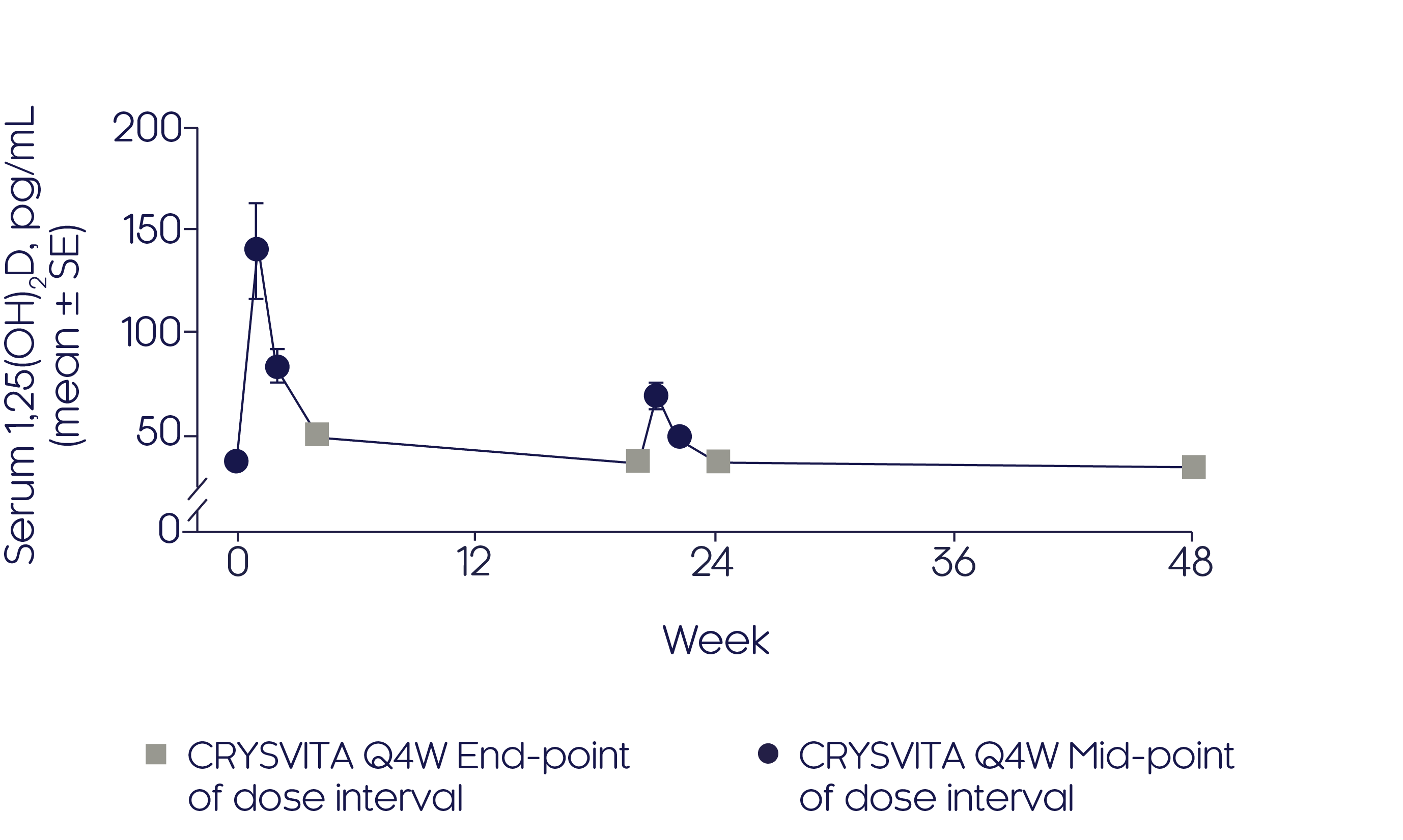
Adapted from Insogna KL, et al, 20193
Phosphate regulation
크리스비타® 성인 XLH 환자에서 통증과 피로를 개선합니다. XLH33
크리스비타® improved pain as shown by a decrease in BPI subscores from baseline to Week 483
BPI scores
Pain and fatigue
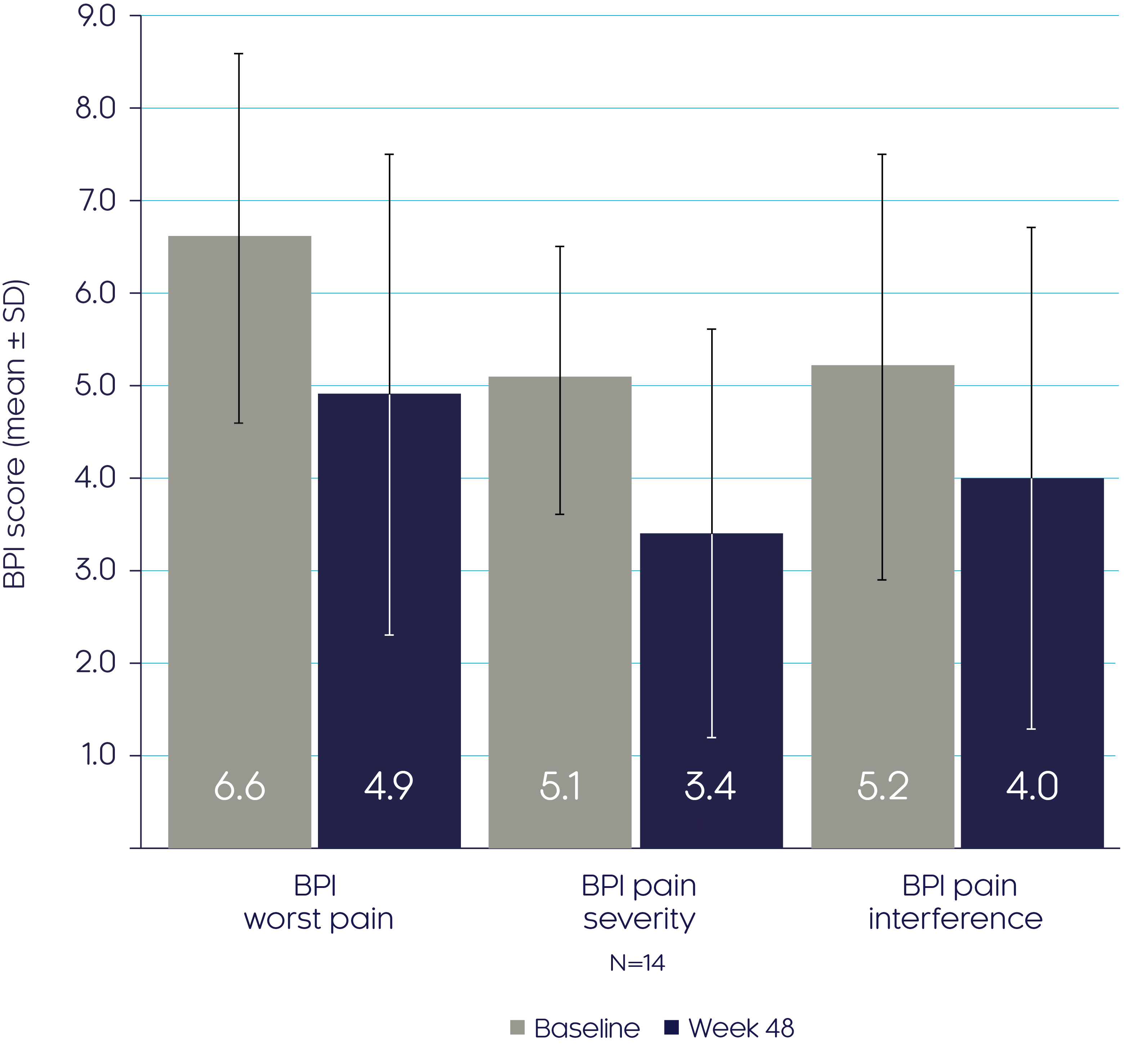
Adapted from Insogna KL, et al, 20193
크리스비타® improved fatigue as shown by a decrease in BFI subscores from baseline to Week 483
BFI scores
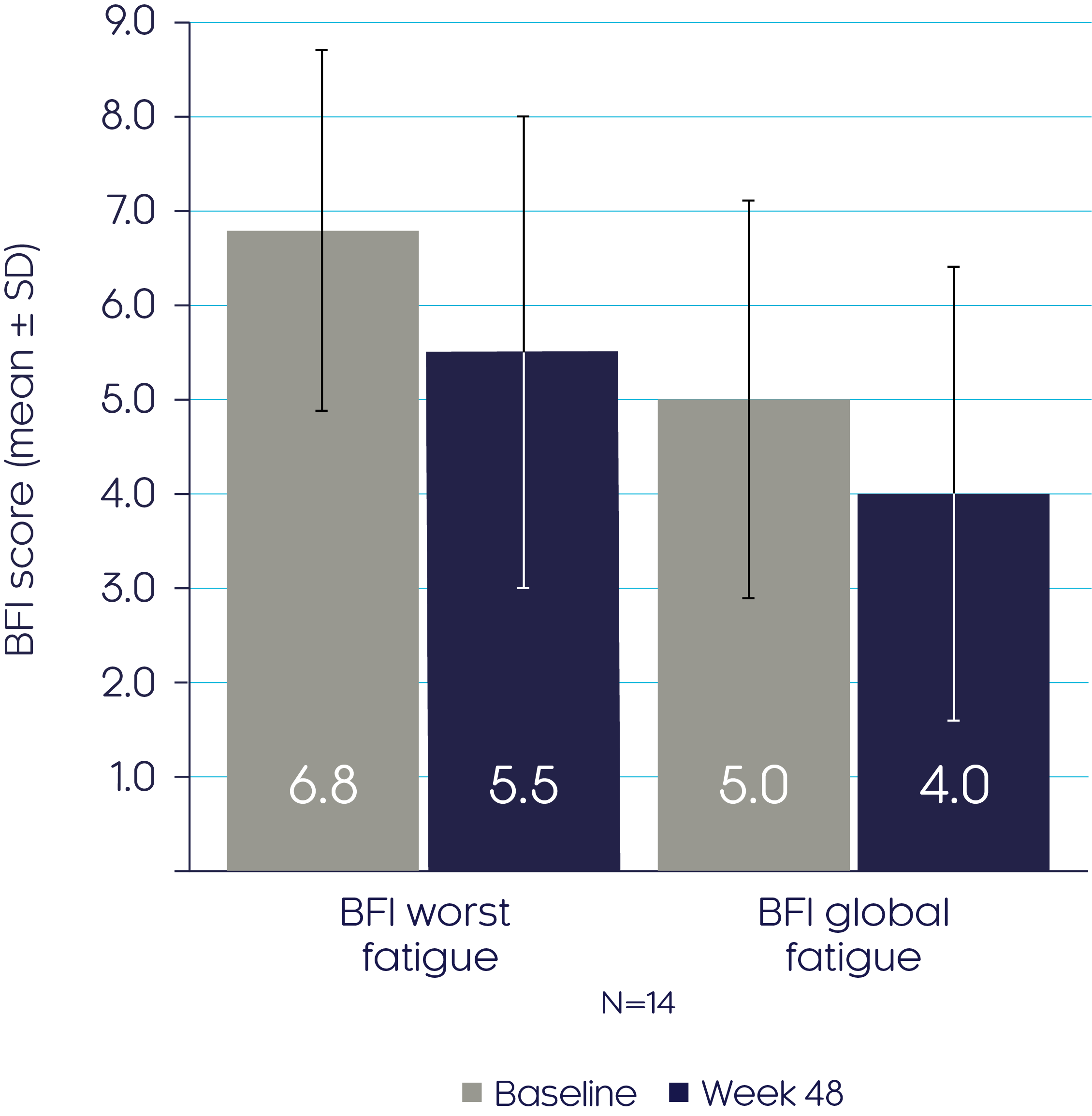
Adapted from Insogna KL, et al, 20193
Bone biopsy measurements before and after treatment show that CRYSVITA® improves bone quality and enhances bone mineralisation in adults with XLH3
Osteomalacia-related histomorphometrics
At Week 48, CRYSVITA® improved bone quality, which was the primary endpoint, demonstrated by a mean reduction in osteoid volume/bone volume and osteoid surface/bone surface of 54% (p<0.001) and 26% (p=0.0002) respectively3
Osteoid Volume/
Bone Volume3
Osteoid Surface/
Bone Surface3
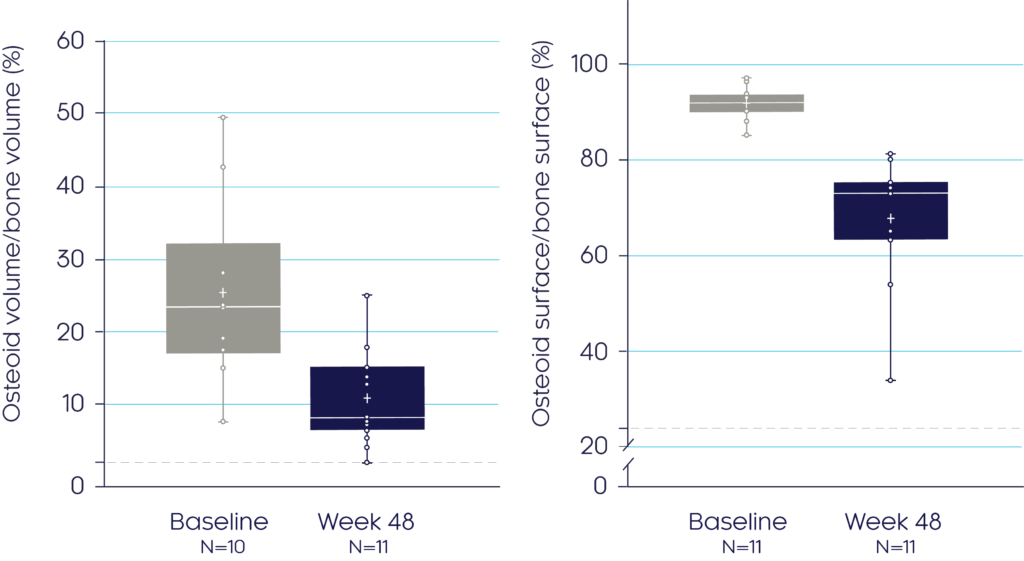
Adapted from Insogna KL, et al, 20193
데이터는 중앙값 (박스 플롯에서 수평선으로 표시됨), 사분위수 및 범위로 제시되어 있습니다.
†파선은 다음에 대한 ULN 기준범위를 나타냅니다: 유골 부피/뼈 부피(3.05%); 유골 표면/골표면(23.9%). 조직형태계측적 평가변수는 양측 t-검정을 사용하여 분석하였습니다. 정규성 가정이 충족되지 않은 경우, 중앙값에 대한 부호 검정을 사용하였습니다.
At Week 48, CRYSVITA® enhanced mineralisation, shown by a mean reduction in osteoid thickness of 32% (p<0.0001) and a reduced mineralisation lag time (p=ns)3
Pseudofractures
Osteoid thickness3
Mineralisation lag time3
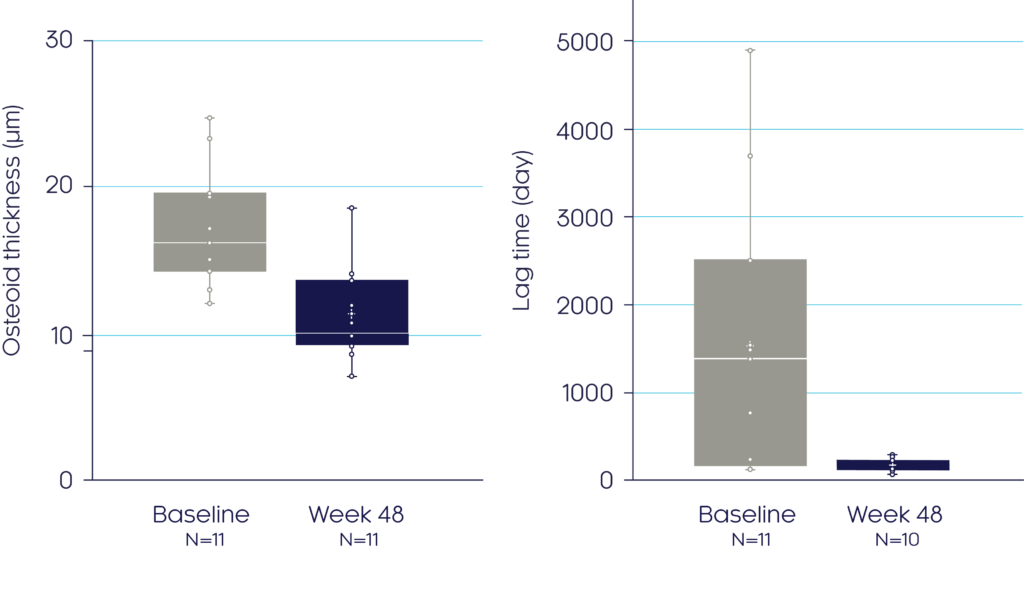
Adapted from Insogna KL, et al, 20193
데이터는 중앙값 (박스 플롯에서 수평선으로 표시됨), 사분위수 및 범위로 제시되어 있습니다.
†파선은 다음에 대한 ULN 기준범위를 나타냅니다: 무기질화 지체시간(28.6일) 및 유골 두께(8.9 μm). 조직형태계측적 평가변수는 양측 t-검정을 사용하여 분석하였습니다. 정규성 가정이 충족되지 않은 경우, 중앙값에 대한 부호 검정을 사용하였습니다.
크리스비타® is associated with healing of pseudofractures3
Bone remodelling (biochemical and dynamic)
- 12주에, 베이스라인에서 활동성 가성골절이 확인된 4명 중 중 2명은 완전히 치유되었고 2명은 부분 치유되었습니다.3
- 48주에, 베이스라인에서 활동성 가성골절이 확인된 4명 중 3명은 치유되었고, 1명은 방사선사진이 누락됨에 따라 평가가 불가능하였습니다.3
크리스비타® improves biochemical and dynamic markers of bone remodelling3
크리스비타® increased serum P1NP and serum CTx levels at Week 48, suggesting improvement in bone remodelling and formation3
- 크리스비타® 치료는 베이스라인과 비교하여 48주에 P1NP 레벨을 유의하게 증가시켰습니다.3
- LS 평균 증가 77% (LS 평균 ± SE 변화 52.5 ± 11.6 ng/mL; p<0.0001)
- 크리스비타® 치료는 베이스라인과 비교하여 48주에 CTx 레벨을 유의하게 증가시켰습니다.3
- LS 평균 증가 36% (LS 평균 ± SE 변화 175.1 ± 44.0 pg/mL; p<0.0001)
- 크리스비타®치료 시, BALP 최고 레벨은 12주에 확인되었습니다.3
- 12주에, 베이스라인으로부터 LS 평균 증가는 53%였습니다. (LS 평균 ± SE 변화 10.9 ± 3.5 μg/L; 95% CI, 4.0 ~ 17.9)
- 48주에, 베이스라인으로부터 LS 평균 증가는 24%였습니다 (4.5 ± 4.0 μg/L; p=0.26)
크리스비타® improved dynamic remodelling parameters at Week 483
| UX023-CL3043 |
Healthy adult reference range† Mean ± SD; median (min, max)3 |
||
|---|---|---|---|
| Parameter | n |
Mean ± SD; median (min, max) | |
| Mineral apposition rate (µm/day) | 0.75 ± 0.09; 0.77 (0.57, 0.86) | ||
| Baseline | 11 | 0.58 ± 0.45; 0.43 (0.3, 1.8) | |
| Week 48 | 11 | 0.62 ± 0.19; 0.60 (0.3, 1.0) | |
| MS/BS (%) | 7.9 ± 2.7; 8.3 (3.3, 12.4) | ||
| Baseline | 11 | 6.0 ± 4.8; 3.3 (1.0, 12.9) | |
| Baseline | 11 | 6.0 ± 4.8; 3.3 (1.0, 12.9) | |
| Week 48 | 10 | 7.0 ± 3.7; 5.8 (2.2, 13.6) | |
| MS/OS (%) | 57.9 ± 13.8; 59.2 (39.9, 74.9) | ||
| Baseline | 11 | 6.5 ± 5.1; 3.7 (1.1, 13.8) | |
| Week 48 | 10 | 10.8 ± 6.1; 8.1 (4.0, 20.3) | |
Adapted from Insogna KL, et al, 20193
††정상범위(healthy reference range)는 뼈 발달 및 대사 이상과 독립적인 이유로 수술을 받은 17.0 - 22.9세 대상자 8-12명으로부터 얻은 데이터에 근거합니다.
Safety (48 Weeks)
크리스비타® was well tolerated and had an acceptable safety profile up to 48 weeks in adults with XLH3
| Category | Incidence for all patients (N=14)† n (%)3 |
|---|---|
| Any TEAE | 14 (100) |
| Related TEAE | 10 (71.4) |
| Injection-site urticaria | 3 (21.4) |
| Abdominal pain | 2 (14.3) |
| Asthenia | 2 (14.3) |
| Injection-site pain | 2 (14.3) |
| Injection-site reaction | 2 (14.3) |
| Serious TEAE | 2 (14.3) |
| Paraesthesia | 1 (7.1) |
| Migraine | 1 (7.1) |
| Category | Incidence for all patients (N=14)† n (%)3 |
|---|---|
| Related serious TEAE | 0 |
| Grade 3 or 4 TEAE | 3 (21.4) |
| Paraesthesia | 1 (7.1) |
| Migraine and arthralgia | 1 (7.1) |
| Uterine haemorrhage | 1 (7.1) |
| TEAE leading to study discontinuation | 0 |
| TEAE leading to treatment discontinuation | 0 |
| TEAE leading to death | 0 |
Adapted from Insogna KL, et al, 20193
†Patients who completed at least 48 weeks of CRYSVITA® treatment, but no more than 84 weeks.
1. Insogna KL, et al. J Bone Miner Res. 2018;33:1383–93. 2. Portale AA, et al. Calcif Tissue Int. 2019;105:271–84. 3. Insogna KL, et al. J Bone Miner Res. 2019;34:2183–91.
